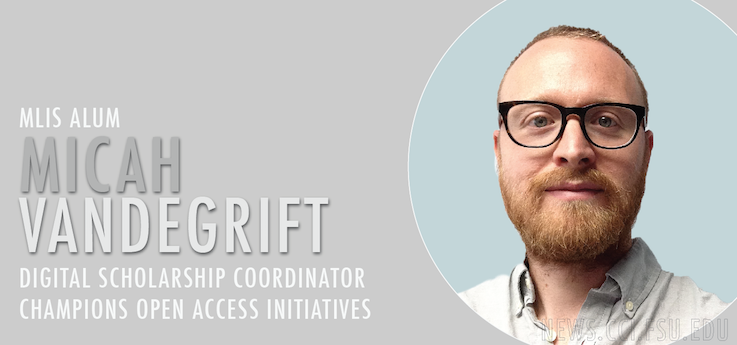
Do you believe that a single person with a piece of advice can change the course of a life? For Micah Vandegrift, his life changed when Dr. Wayne Wiegand suggested he pursue his Master’s in Library and Information Science (MLIS) after Vandegrift was rejected from several doctoral programs. Luckily, the MLIS program had a late summer deadline. He applied to Florida State University’s MLIS program and the rest, folks, is history.
Today, Vandegrift is FSU’s first Digital Scholarship Coordinator based out of Strozier Library. Though he just happens to be housed in a library, Vandegrift’s work varies greatly from his librarian colleagues.
He first came to Florida State in 2003, pursuing a degree in Humanities, feeding his fascination with culture, music and history. From there, he pursued an MA in American Studies, graduating in 2009 and went on to receive his MLIS in 2011.
Beginning his academic career in University Libraries as the Scholarly Communication Librarian, Micah’s first task was to work with a faculty committee to make recommendations as to how the university should react to digital, online, and open research. Open access, a term that has been murmured in research labs, libraries and universities for nearly 25 years, is the principle that research literature should be available online without price or permission barriers.
In today’s libraries, most research journals are available electronically. University libraries buy research journals through subscriptions to publishers. Since journals moved from print to digital access, the publishers now effectively rent access to the research community, and continually increasing subscription costs as much as 10% annually over the past decade. Typically, when research is published in a journal it is no longer owned by the researcher – it becomes the intellectual property of the Publisher.
Open access, Vandegrift explains, proposes that these costs and rights situations present an access barrier that slows scientific and humanistic inquiry Participating in open access, whether through open access journals or archiving traditionally published works in a open archive, offers high quality academic research for free to anyone with an internet connection. This open approach to research is seen as unorthodox, although many Universities (UNC-Chapel Hill, University of Kansas, Indiana University-Purdue University Indianapolis and many others) have embraced it by passing campus-wide open access policies.
Additionally, research funders are embracing openness in research. The Consolidated Appropriations Act of 2014 (HR 3547) required federal agencies with more than $100M in research budgets to develop open access policies to make research available within one year of publication. Research funded by the National Science Foundation, Department of Education, Health and Human Services, Centers for Disease Control, Agency for Healthcare Research and Quality, Food and Drug Administration, National Institutes of Health and more must be made publicly accessible. These mandates are rolling out in October and over the next year.
Vandegrift was recently cited about this change in an article in The Chronicle of Higher Education. The longtime advocate of open access has changed his approach from idealistic encouragement to funder compliance. As the Digital Scholarship Coordinator, Vandegrift is working with a team of librarians to integrate more deeply into the research lifecycle, connecting disciplines and developing research infrastructure. He works alongside fellow MLIS graduate Renaine Julian, Data Research Librarian.
One unique aspect of this new research integration for University Libraries is consultations on data management plans. The new public access mandates from research funders often require that the grant proposal now include a data management plans (DMP), outlining the practices for collecting, organizing, backing up, storing, and making accessible the data generated by the study. From conceptualization to execution Vandegrift and Julian are available for expertise in the management of research data. The duo has done around ten consultations this year with follow up and integration to follow.
As a capstone on the work University Libraries has done in the areas of open access and data management, on November 5th from 10am-2pm, they will host a symposium titled “Exploring Digital Scholarship: Data, Texts and Tools” in Strozier’s Scholars Commons. The event will feature discussions; opportunities to play with data visualization, text analysis and mapping tools; and panels on grants and funding, digital projects & an intro to text encoding.
“It’s a very exciting time to be working at FSU Libraries,” Vandegrift said. “We are working really hard to be a model of an academic research library, participating in and articulating the research goals of the University.”
Learn more about University Libraries Office of Digital Research and Scholarship at https://www.lib.fsu.edu/drs or email mvandegrift@fsu.edu.

